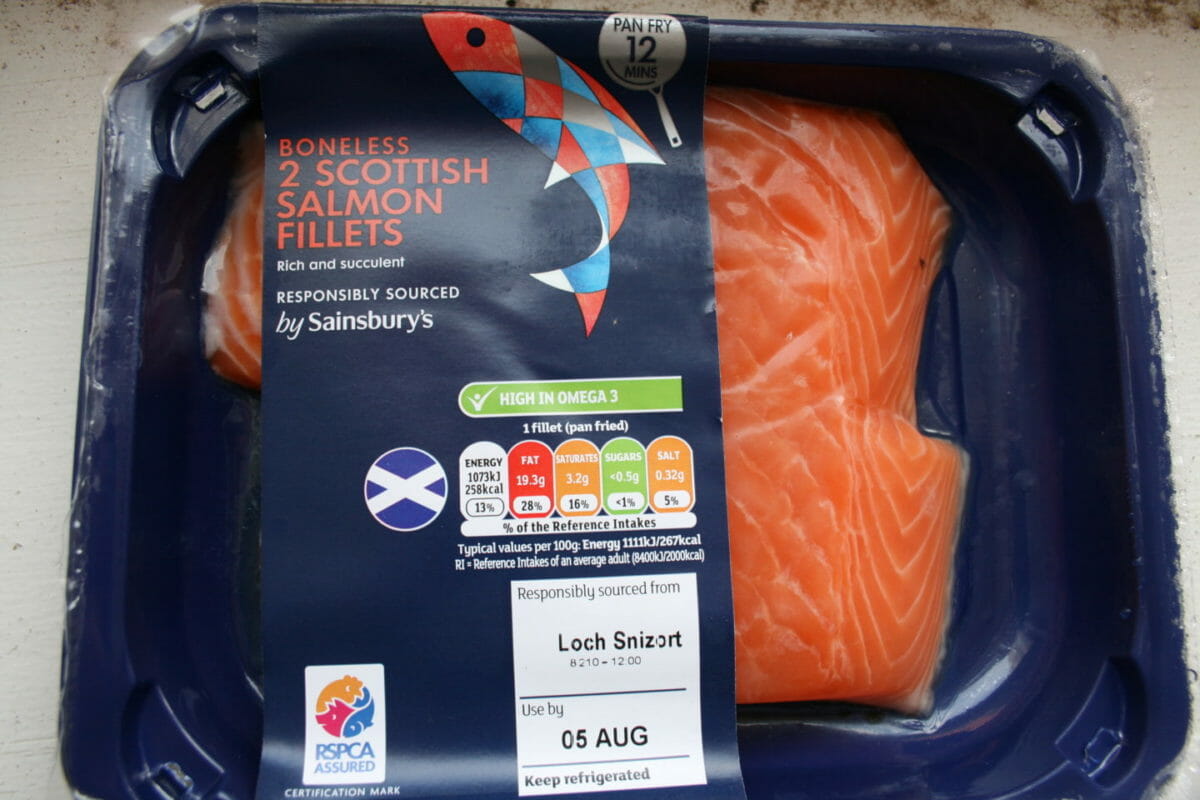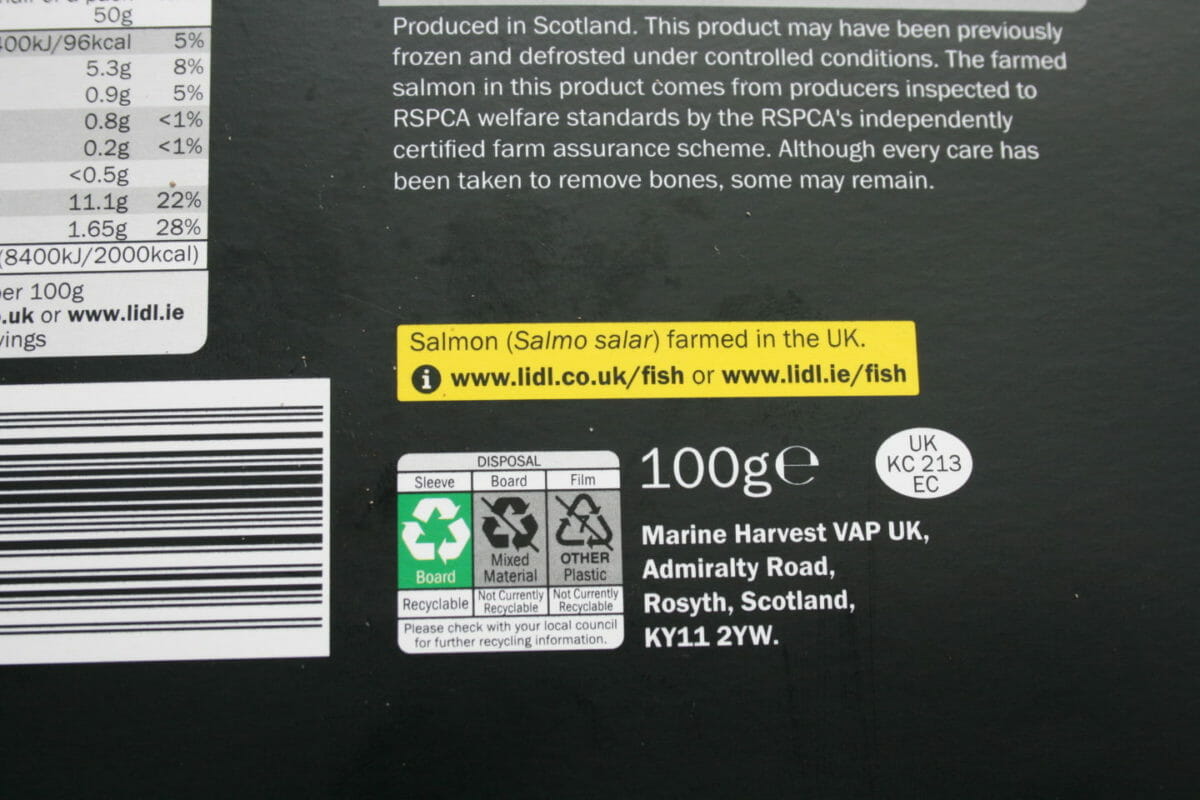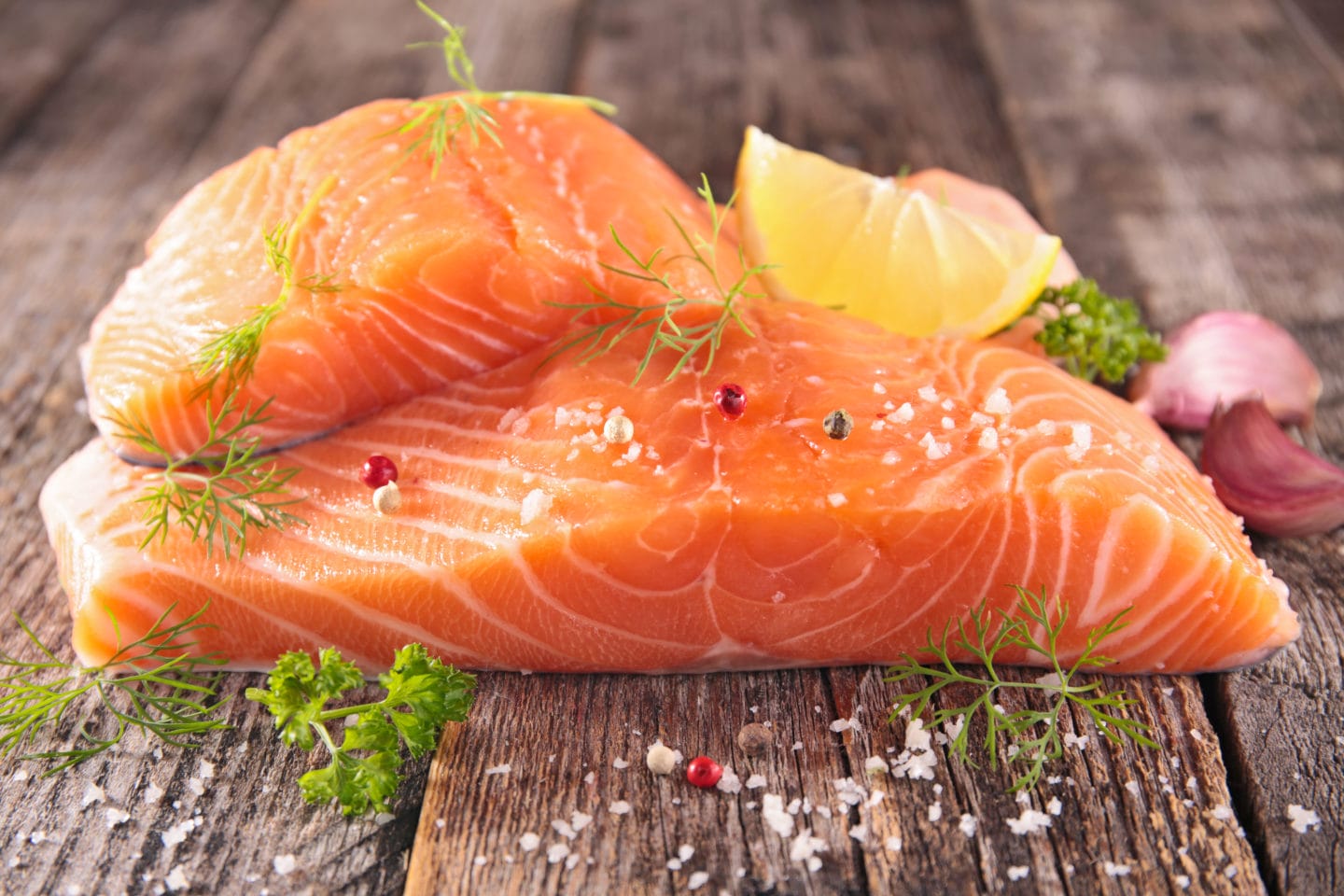Supermarkets are selling farmed salmon from companies accused of poor animal welfare, we can reveal, prompting claims that consumers are being misled into thinking they are buying responsibly sourced fish.
Supermarkets who have sold salmon sourced from firms named in a report by animal welfare charity, OneKind, include Aldi, Co-op, Lidl, Morrisons, M&S, Sainsbury and Tesco.
Concerns have also been raised over the “RSPCA Assured” endorsement which is awarded for “ethical food” and used by supermarkets to promote salmon sales.
As revealed by The Ferret on 4 August OneKind has produced league tables highlighting the salmon farmers with the worst records on animal welfare in 2017. OneKind ranked the performance of companies and fish farms on death rates, overcrowding, lice infestations, seal shooting and escapes.
Companies criticised for standards include Marine Harvest, The Scottish Salmon Company, Scottish Sea Farms Ltd and Grieg Seafood Shetland.
OneKind said that fish were suffering and called on salmon farmers to “urgently up their game”. The fish farming industry said in response the report failed to accurately reflect the efforts farms take to ensure good animal welfare.

Supermarkets sell farmed salmon as a healthy food and they market products as responsibly sourced. Some packaging carries the “RSPCA Assured” logo.
As part of our investigation, we purchased salmon from eight supermarkets and examined packaging for details on where the fish was sourced. None of the products specified which farms the salmon came from. Lidl reveals it sources fish from Marine Harvest. M&S and Sainsbury provide the names of places where salmon are sourced, but not firms or individual farms.
We learned that Co-op sources salmon from The Scottish Salmon Company, one of the worst firms for fish mortality rates, according to OneKind. The Scottish Salmon Company was second highest for escapes and fourth top for shooting seals, with seven shot in 2017.
The Scottish Salmon Company declined to comment. The Co-op said: “Salmon welfare is a top priority for the Co-op and our suppliers are expected to adhere to our strict welfare requirements. To monitor adherence and drive improvements we regularly inspect sites and have a dedicated Salmon Farming Group which monitors fish health and welfare.”
Sainsbury sources salmon from Marine Harvest, which shot the most number seals (13) in 2017. Marine Harvest runs Poll na Gill salmon farm which was said to have breached biomass limits set by the Scottish Environment Protection Agency (Sepa) six times in 2017, sometimes up to 50 per cent. “This meant that they significantly overstocked their fish cages, seriously compromising welfare,” alleged OneKind.
Sainsbury declined to comment but its website details the firm’s policy on sourcing fish. It says: “We’re also proud that 100 per cent of our farmed seafood was certified against a recognised, independent sustainability standard by 2016.
“We were the first major retailer, for example, to sell farmed river cobbler certified by the Aquaculture Stewardship Council. And we were also the first to sell RSPCA Freedom Food (now RSPCA Assured) loch trout. This helps ensure that high standards of animal welfare aren’t just for land animals: they also count for fish.”
M&S sources salmon from Scottish Sea Farms Ltd which was ranked third best overall for welfare. However, the company was second worst for monthly mortality rates and joint second highest for escapes. Three of its sites were in the top seven for shooting seals. The company was also responsible for heavy sea lice burdens. Scottish Seafarms Ltd declined to comment.
M&S also declined to comment but its website says: “Our exclusively farmed Lochmuir™ Salmon is specially grown for M&S using a unique feed and award winning farms. The farms are all audited to Marks & Spencer specifications enabling us to give our customers assurances on animal welfare, food safety, and quality. The husbandry of fish is also approved by RSPCA Freedom Food, representing the best possible standards of care.”
It was revealed in 2006 that Lochmuir was was not a real place, but a brand invented by M&S marketing experts

Lidl also sources salmon from Marine Harvest. Lidl declined to comment but referred us to its sourcing policy, which says: “At Lidl UK, the principles of responsible fish and seafood sourcing are led from ensuring that the fish sold within our product ranges are sourced from the healthiest stocks possible using the least destructive fishing methods possible, with high regard for both environmental and social standards.”
Aldi and Morrisons have sourced salmon from Marine Harvest but both supermarkets declined to comment. Aldi’s website says: “We’re committed to the principles of responsibility and sustainability in the sourcing of our own label fish. We aim to buy all our seafood products from responsibly managed fisheries and farms that have a minimal impact upon the wider marine environment.”
Morrisons website says: “Our range of farmed seafood includes more than 10 species ranging from salmon and warm water prawns to artic char and halibut. All of our farmed products come from independently assessed and certified farms, hatcheries and feed mills. Instead of third party logos we put our responsibly farmed logos onto our seafood products.”
Tesco sources fish from Grieg Seafood Shetland also named for alleged poor welfare. Its farms were the worst for sea lice burdens, OneKind said.
In response, Grieg Seafood Shetland insisted that it was a responsible farmer committed to ensuring the highest standards of health and welfare across all its farms. “We have a demonstrable track record in innovation and investment and have adopted an integrated and sustainable approach to disease management,” said managing director, Grant Cumming.
“Our focus is to first prevent disease from occurring and then, if it does occur, to ensure the welfare of the fish through responsible and effective treatment. We are working hard to ensure our fish have a high quality of life and will continue to work positively with all the regulators of Scottish fish farming to ensure we have a sustainable industry long into the future.”
Tesco’s policy statement says: “Just like with terrestrial animals, we expect our suppliers to apply similarly high animal welfare standards to our farmed fish. These welfare standards cover all aspects of farmed fishing from hatchery to farm and then to slaughter. They apply to our global supply chains for the UK market.”

Asda used to source salmon from Marine Harvest but declined to comment or clarify where it currently sources fish.
Harry Huyton, director of OneKind, said consumers would be “shocked” to find out that some salmon products in supermarkets are sourced from companies with “high welfare issues” such as lice infestations, diseases and deformities.
He added: “Not only is this suffering unacceptable, but this is hugely damaging to the reputation of both Scottish salmon farms and supermarkets who are misleading the public into thinking they are buying responsibly sourced fish when that is clearly not the case.”
Joanna Blythman, a food writer and restaurant critic, said that she does not consider farmed salmon to be “an environmentally aware, ethical, healthy choice”.
She added: “It’s been clear for years that this industry has proved to be an environmental disaster for the west coast of Scotland. Greedy multinationals have debased our ‘king of fish’ and subsequent Scottish governments have aided and abetted them.
“I have absolutely no confidence in the Scottish salmon farming industry. Rather than face up to the mess it has created, it is still trying to come up with magic bullet ‘solutions’, like feeding the fish on GM feed. Just another example of its dinosaur-like inability to change.”
Don Staniford of pressure group Scottish Salmon Watch accused the Royal Society for the Prevention of Cruelty to Animals of earning £1m a year from its fish farm certification scheme. “RSPCA Assured Scottish salmon makes a mockery of high welfare standards,” he said. “The RSPCA should launch a campaign to close down poor performing salmon farms. Supermarkets should stop selling ‘welfare-friendly’ Scottish salmon which is a sham.”
However, Julie Hesketh-Laird, chief executive of the Scottish Salmon Producers’ Organisation, defended the industry and said its members “work tirelessly to ensure salmon is reared in a sustainable manner to high welfare standards”.
She said that fish health and “maintaining a high quality and diverse environment in which fish are raised” are of “paramount importance and underpin the success of salmon farming businesses and jobs they support”.
Hesketh-Laird continued: “Working in nature inevitably means that farmers deal with, as part of their regular routine, environmental challenges which occur naturally and predators which can cause significant damage and harm the welfare of farm-raised salmon.
“The salmon farming sector continues to invest significantly in innovation and R&D in partnership with the private and academic sectors as well as with government and regulators.”
She also queried OneKind’s analysis and said that not all of the key indicators chosen “accurately reflect the care taken at farms to ensure good animal welfare”.
“For example, overall fish biomass is not a relevant indicator as all our members’ farms are committed to a comfortable stocking density for salmon – each net pen containing about two per cent fish and 98 per cent water at maximum density allowing salmon to shoal naturally.”
She added: “Aquaculture is a tightly regulated food production sector with a strong requirement for transparency of information. Our members will continue to work to meet the highest regulatory standards, exceeding mandatory requirements wherever possible, and, in individual instances where incidents do occur, will work to improve and embed learnings into future practices.”
RSPCA Assured said it could not comment on the report until it had reviewed its findings but it disputed Staniford’s allegation that it made £1m a year from certifying salmon farms. “This is far from the case and makes the erroneous assumption that all the salmon reared to RSPCA welfare standards then goes on to be sold in retail, bearing the RSPCA Assured certification mark,” said a spokeswoman.
“In reality, less than half of the salmon produced goes on to be sold as RSPCA Assured and incur a licence fee. Without charging a fee we could not afford to continue to operate the scheme.”
RSPCA Assured also explained its approach to RSPCA Assured salmon farms. It said that members are subject to annual assessments by assessors and a proportion are also subject to monitoring visits from RSPCA farm livestock officers.
The spokeswoman said: “Farms are inspected to 500 standards aimed at improving welfare and the RSPCA are working with members and academics to find new ways to better manage, for example, the threat of disease and sea lice.”
She continued: “Sadly, it is a reality of any farming system that from time to time there will be disease outbreaks. And, the marine environment is uniquely dynamic and changes rapidly beyond anyone’s control due to factors such as bad weather.
“This can occur very swiftly and impact on a farm’s compliance with wider environmental requirements. When such changes do occur, RSPCA Assured members must rectify the situation as quickly as possible through action plans that are carefully monitored by Sepa.
“We don’t claim to have all the answers to solving the challenges involved in salmon farming, but we firmly believe it is far better for us to be involved in trying to find solutions, than sitting on the sidelines doing nothing to help improve the welfare of salmon.”
This story is the second of a three-part investigation into fish farming funded by Eurogroup for Animals in Brussels via OneKind, under an agreement giving The Ferret full editorial control.














